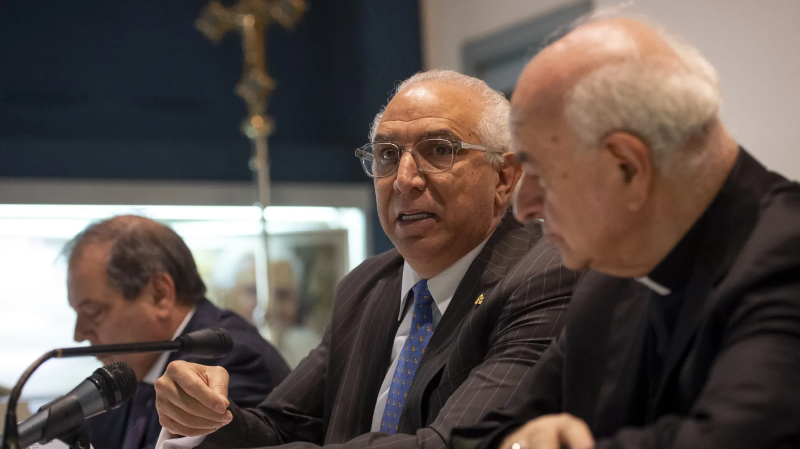
Family Doctors Launched at the Vatican
Wednesday, 22nd November 2023
SOMOS Community Care, backed by the Pontifical Academy for Life, is promoting an awareness campaign on the role and vocation of primary care physicians.
On November 16, at the Vatican, the nonprofit SOMOS Community Care, represented by its president, Dr. Ramón Tallaj, and its CEO, Dr. Mario Paredes, launched the world’s first campaign to support family doctors. This initiative, blessed by Pope Francis, as confirmed by Archbishop Vincenzo Paglia, president of the Pontifical Academy for Life, aims to rediscover the doctor-patient relationship.
Rediscovering the Doctor-Patient
Relationship Archbishop Paglia opened the presentation, emphasizing the importance of rediscovering the doctor-patient relationship, fundamental to he heart of medicine: the human being is never alone in illness. He noted that thirty-three of Jesus’ fifty miracles recorded in the Gospels were healings, all relational in some way, either directly or through a family member. He also highlighted the excellence of the Italian health system, particularly its emphasis on the trust between general practitioners and patients.
A Declaration to Renew the Health System
Dr. Tallaj explained the campaign’s goal: to have as many individuals, groups, foundations, hospitals, associations, and communities of all kinds and religions sign the “Declaration for the Rediscovery of the Role of the Family Doctor”. Once signed, the document will be presented to governments, institutions, and health systems to guide public policies, enhancing the irreplaceable role of family doctors. He described the campaign as “exciting, visionary, and necessary” in light of current health, economic, migratory, ecological, and war crises.Pope Francis himself, as reported by Dr. Tallaj, lamented the near disappearance of the family doctor, warning against the neglect of the quality of local health services or their excessive bureaucratization and digitization, which could exclude or marginalize the elderly or less educated. He emphasized the personal relationship between patient and family doctor, who has a holistic view of the person, their environment, and medical history.
Dr. Tallaj stressed the importance of prevention based on the doctor-patient relationship, noting that prevention fails when the health system intervenes only after a person’s condition has deteriorated, incurring high human and social costs.
He also noted the family doctor’s role in coordinating care, both in referring patients to specialists and in understanding their family medical history.
The Humanizing Role of the Family Doctor
Dr. Paredes, CEO of SOMOS Community Care, focused on the humanizing role of the family doctor in the health system and society, outlining four reasons for its essentiality.
Firstly, the family doctor is the patient’s primary access point to the health system, guiding them through the network of individual specialties.
Secondly, this doctor is trained to treat a wide range of health problems and thus can treat patients of all ages and conditions, especially knowing their medical history and life context, with the trust established enabling more personalized and effective care.
Thirdly, through constant contact with the patient via regular check-ups, screening tests, and lifestyle advice, the general practitioner plays a key role in preventing health issues, identifying diseases at an early, more treatable stage, and educating patients on healthy living.
Lastly, the general practitioner allows both the patient and the health system to significantly reduce costs and receive more effective treatment, as they manage various health issues, focusing on prevention and early diagnosis, helping to avoid complications requiring costlier treatment and unnecessary specialist visits or tests.
Trust as the Key
Dr. Filippo Anelli, president of the National Federation of Italian Doctors, representing nearly half a million physicians, also insisted on the trust between patient and doctor, enabling holistic diagnoses. This understanding, as Dr. Paredes suggested, has positive economic implications for both the patient and the health system.
He emphasized patients’ current desire not to give up their right to choose their doctor.
In conclusion, he echoed Archbishop Paglia’s earlier point about the excellence of the Italian health system, based on general medicine rather than a shareholder-like structure.
The documentation of the presentation and initiative can be found at: http://www.thankyoudoctor.org.
Volver a las noticias